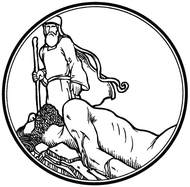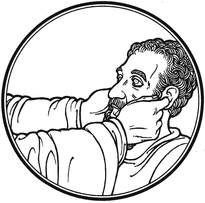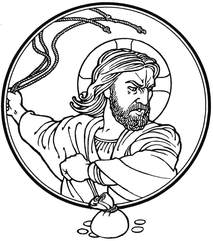Jesus is Our Good Samaritan The Law cannot help us or give us life. Rather, it confines everyone under sin as wounded and naked before God (Gal. 3:15–22). So it is that two figures of the Law, the priest and the Levite, passed by the injured man on the side of the road (Luke 10:23–37). Only the promised Seed of Abraham can rescue us and make us righteous before God. Only the Samaritan, our Lord Jesus, had compassion, as did the Samaritans of old (2 Chronicles 28:8–15). He came down to us in our lost and dying condition, pouring on the oil and wine of the Sacraments. He placed us on His own animal, bearing our sin and brokenness in His body on the cross to restore us. Jesus brought us to the inn, that is, the Church, and gave the innkeeper two denarii, that His double forgiveness might continue to be ministered to us. In this way the Lord, by whose Law we are torn and stricken, heals us and revives us by His Gospel and raises us up with Himself.
0 Comments
Faith Comes from Hearing
A man who was deaf and therefore also had an impediment in his speech was brought to Jesus (Mark 7:31–37). In the same way, all are by nature deaf toward God and therefore also unable to confess the faith rightly. For “faith comes from hearing, and hearing through the word of Christ” (Rom. 10:9–17). Jesus put His fingers into the man’s ears, and He spat and touched His tongue. Even so in Holy Baptism, water sanctified by the words of Jesus’ mouth is applied to us; and the finger of God, that is, the life–giving Holy Spirit (2 Cor. 3:4–11) is put into our ears in the hearing of the baptismal Gospel. Jesus’ sighing “Ephphatha” opened the man’s ears, and his tongue was loosed to speak plainly as Isaiah prophesied of the Messiah, “In that day the deaf shall hear the words of a book” (Is. 29:18–24) So also, He who sighed and breathed His last on the cross for us has given us to hear and believe in Him and has opened our lips that our mouths may declare His praise.
The Lord Lifts Up the Lowly
“And the Lord had regard for Abel and his offering, but for Cain and his offering he had no regard” (Gen. 4:1–15). For unlike Abel, Cain’s offering did not proceed from a heart that revered and trusted in the Lord. Thus, the lowly tax collector who prayed, “God, be merciful to me, a sinner!” was the one who went down to his house justified before God, not the respectable, outwardly righteous Pharisee who trusted in himself and his own good living (Luke 18:9–14). “For by grace you have been saved through faith. And this is not your own doing; it is the gift of God, not a result of works, so that no one may boast” (Eph. 2:1–10). The one who penitently despairs of his own righteousness and relies completely on the atoning mercy of God in Christ is the one who is declared righteous. For Christ died for our sins and rose again the third day (1 Cor. 15:1–10). Therefore, “everyone who exalts himself will be humbled, but the one who humbles himself will be exalted.”
Jesus Weeps for Jerusalem
Our Lord wept over Jerusalem for the destruction that would soon come upon her. For she did not recognize the time of God’s visitation in Christ, who had come to bring her peace (Luke 19:41–48). Through His prophets God had consistently called His people to turn from their deceit and false worship. “But My people do not know the judgments of the Lord” (Jer. 8:4–12). They sought to establish their own righteousness rather than receive Christ’s righteousness through faith (Rom. 9:30–10:4). So it was that God was in His temple to cleanse it, a precursor to the once-for-all cleansing from sin which He would accomplish in the temple of His own body on the cross. God grant us to know the things that make for our peace—His visitation in the Word and Sacraments—that by the Holy Spirit we may penitently confess “Jesus is Lord” (1 Cor. 12:1–11).
|
Archives
February 2019
Categories
All
|
||||||||||||||||||||||||

 RSS Feed
RSS Feed
